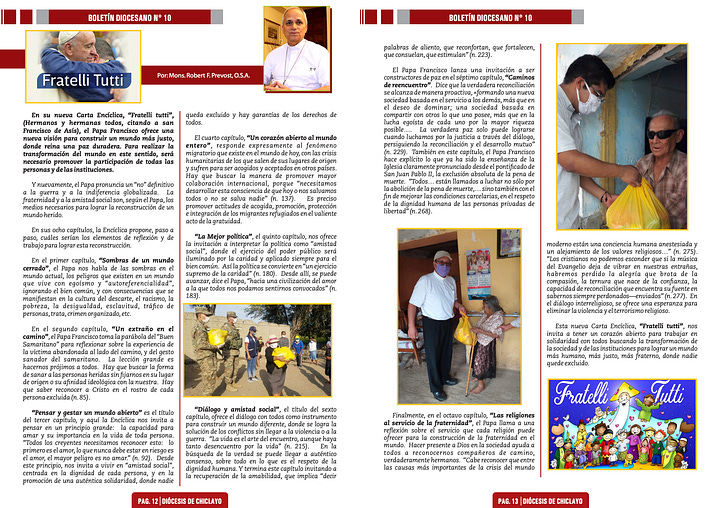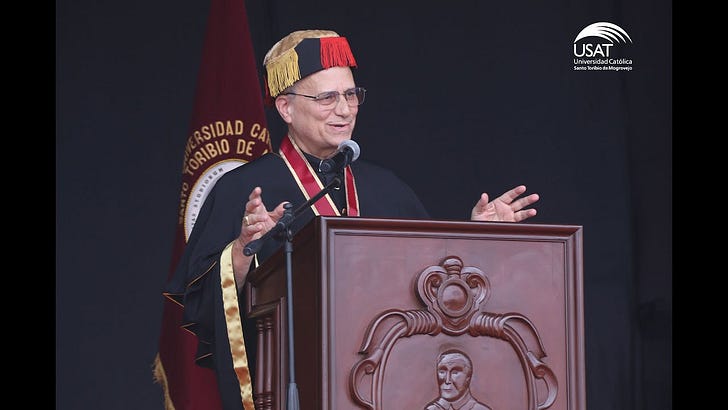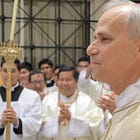Leo XIV: 'Absolute exclusion of the death penalty'
In his diocesan bulletin for February 2021, then-Bishop Robert Prevost, now Leo XIV, explained Francis' 'Fratelli Tutti' and made some intriguing affirmations about the death penalty.

In his diocesan bulletin for February 2021, Bishop Robert Prevost, now Leo XIV, explained Francis' 'Fratelli Tutti' and made some intriguing affirmations about the death penalty.
Dr Edmund Mazza has drawn attention to an article written by Leo XIV, then-Bishop Robert Prevost, in his February 2021 diocesan bulletin for the diocese of Chiclayo.
In this article, Prevost writes as follows:
Also in this chapter, Francis makes explicit what has already been the teaching clearly pronounced by the Church since the pontificate of John Paul II: the absolute exclusion of the death penalty. “All… are called to struggle not only for the abolition of the death penalty… but also in order to improve prison conditions, with respect for the human dignity of those deprived of their liberty” (n. 268).
This bulletin provides further context for Prevost’s 2015 tweet, and the comments made in 2022, in which he referred to the “inadmissibility” of the death penalty:
It is clear from the above that Prevost is aware that this doctrine is new, having been “clearly pronounced […] since the pontificate of John Paul II.” However, the legitimacy of the death penalty is a revealed truth, which must be believed with divine and Catholic faith. Claiming that the death penalty is absolutely excluded would appear to go beyond claim that the alleged “inadmissibility” is based on the circumstances of our time.
In any case, it makes little sense to argue that the death penalty is “inadmissible” based on intrinsic human dignity, and then try to claim that “inadmissibility” refers to contemporary circumstances which render the death penalty disproportionate and unnecessary. Such argumentation, employed by the various Catholic influencers under Francis, appears to be little more than word-games.
It is better and more honest to own the fact that this is a new teaching intending to exclude the death absolutely—as the then-Bishop Prevost seems to do in this text.
What follows is our translation of the passage in question, along with the surrounding paragraphs for context. We have also provided scans of the bulletin in question, and a transcription of the Spanish text.
Comments on Fratelli Tutti
Mons. Robert F. Prevost OSA
Diocesan Bulletin N. 10, February 2021, pp 12-13
In his new Encyclical Letter, Fratelli tutti (“All brothers and sisters”, quoting Saint Francis of Assisi), Francis offers a new vision for building a more just world, where lasting peace reigns. In order to bring about the transformation of the world in this direction, it will be necessary to promote the participation of all persons and institutions.
Once again, the pope issues a definitive no to war and to globalised indifference. Fraternity and social friendship are, according to the pope, the necessary means to bring about the reconstruction of a wounded world.
In its eight chapters, the Encyclical sets out, step by step, what the elements of reflection and labour would be in order to achieve this reconstruction.
[...]
“Dialogue and social friendship”, the title of the sixth chapter, presents dialogue with all as an instrument for building a different world, where conflicts are resolved without resorting to violence or war. “Life is the art of encounter, even though there is so much dis-encounter throughout life” (n. 215). In the search for truth, one can arrive at true consensus, especially regarding the respect for human dignity. This chapter concludes with an invitation to recover kindness, which entails “speaking words of encouragement, that comfort, that strengthen, that console, that stimulate” (n. 223).
Francis issues an invitation to be builders of peace in the seventh chapter, “Paths of Renewed Encounter”. He says that true reconciliation is attained proactively, “forming a new society based on service to others, more than on the desire to dominate; a society based on sharing with others what one possesses, more than on the selfish struggle of each one for the greatest possible wealth... True peace can only be achieved when we fight for justice through dialogue, pursuing reconciliation and mutual development” (n. 229). Also in this chapter, Francis makes explicit what has already been the teaching clearly pronounced by the Church since the pontificate of John Paul II: the absolute exclusion of the death penalty. “All… are called to struggle not only for the abolition of the death penalty… but also in order to improve prison conditions, with respect for the human dignity of those deprived of their liberty” (n. 268).
Finally, in the eighth chapter, “Religions at the service of fraternity”, the pope calls for reflection on the service that each religion can offer in the construction of fraternity in the world. Making God present in society helps everyone to recognise one another as fellow travellers, truly brothers. “It must be acknowledged that among the most important causes of the crisis in the modern world are an anaesthetised human conscience and a distancing from religious values...” (n. 275). “We Christians cannot hide that if the music of the Gospel ceases to vibrate in our depths, we shall have lost the joy that springs from compassion, the tenderness that is born of trust, the capacity for reconciliation that finds its source in the knowledge that we are always forgiven—sent forth” (n. 277). In interreligious dialogue, a hope is offered for the elimination of violence and religious terrorism.
This new Encyclical Letter, Fratelli tutti, invites us to have an open heart to labour in solidarity with all, seeking the transformation of society and institutions to bring about a more human, more just, more fraternal world, where no one is excluded.
Original Bulletin


Spanish Original
En su nueva Carta Encíclica, “Fratelli tutti”, (Hermanos y hermanas todos, citando a san Francisco de Asís), el Papa Francisco ofrece una nueva visión para construir un mundo más justo, donde reina una paz duradera. Para realizar la transformación del mundo en este sentido, será necesario promover la participación de todas las personas y de las instituciones.
Y nuevamente, el Papa pronuncia un “no” definitivo a la guerra y a la indiferencia globalizada. La fraternidad y a la amistad social son, según el Papa, los medios necesarios para lograr la reconstrucción de un mundo herido.
En sus ocho capítulos, la Encíclica propone, paso a paso, cuáles serían los elementos de reflexión y de trabajo para lograr esta reconstrucción.
[...]
“Diálogo y amistad social”, el título del sexto capítulo, ofrece el diálogo con todos como instrumento para construir un mundo diferente, donde se logra la solución de los conflictos sin llegar a la violencia o a la guerra. “La vida es el arte del encuentro, aunque haya tanto desencuentro por la vida” (n. 215). En la búsqueda de la verdad se puede llegar a auténtico consenso, sobre todo en lo que es el respeto de la dignidad humana. Y termina este capítulo invitando a la recuperación de la amabilidad, que implica “decir palabras de aliento, que reconfortan, que fortalecen, que consuelan, que estimulan” (n. 223).
El Papa Francisco lanza una invitación a ser constructores de paz en el séptimo capítulo, “Caminos de reencuentro”. Dice que la verdadera reconciliación se alcanza de manera proactiva, «formando una nueva sociedad basada en el servicio a los demás, más que en el deseo de dominar; una sociedad basada en compartir con otros lo que uno posee, más que en la lucha egoísta de cada uno por la mayor riqueza posible…. La verdadera paz solo puede lograrse cuando luchamos por la justicia a través del diálogo, persiguiendo la reconciliación y el desarrollo mutuo” (n. 229). También en este capítulo, el Papa Francisco hace explícito lo que ya ha sido la enseñanza de la Iglesia claramente pronunciado desde el pontificado de San Juan Pablo II, la exclusión absoluta de la pena de muerte. “Todos… están llamados a luchar no sólo por la abolición de la pena de muerte,… sino también con el n de mejorar las condiciones carcelarias, en el respeto de la dignidad humana de las personas privadas de libertad” (n. 268)
Finalmente, en el octavo capítulo, “Las religiones al servicio de la fraternidad”, el Papa llama a una reflexión sobre el servicio que cada religión puede ofrecer para la construcción de la fraternidad en el mundo. Hacer presente a Dios en la sociedad ayuda a todos a reconocernos compañeros de camino, verdaderamente hermanos. “Cabe reconocer que entre las causas más importantes de la crisis del mundo moderno están una conciencia humana anestesiada y un alejamiento de los valores religiosos…” (n. 275). “Los cristianos no podemos esconder que si la música del Evangelio deja de vibrar en nuestras entrañas, habremos perdido la alegría que brota de la compasión, la ternura que nace de la confianza, la capacidad de reconciliación que encuentra su fuente en sabernos siempre perdonados—enviados” (n. 277). En el diálogo interreligioso, se ofrece una esperanza para eliminar la violencia y el terrorismo religioso.
Esta nueva Carta Encíclica, “Fratelli tutti”, nos invita a tener un corazón abierto para trabajar en solidaridad con todos buscando la transformación de la sociedad y de las instituciones para lograr un mundo más humano, más justo, más fraterno, donde nadie quede excluido.
HELP KEEP THE WM REVIEW ONLINE WITH WM+!
As we expand The WM Review we would like to keep providing free articles for everyone.
Our work takes a lot of time and effort to produce. If you have benefitted from it please do consider supporting us financially.
A subscription gets you access to our exclusive WM+ material, and helps ensure that we can keep writing and sharing free material for all.
(We make our WM+ material freely available to clergy, priests and seminarians upon request. Please subscribe and reply to the email if this applies to you.)
Subscribe to WM+ now to make sure you always receive our material. Thank you!
Further reading:
Follow on Twitter, YouTube and Telegram:





The Holy Ghost had not yet descended at Pentecost. A prelate has received the sacrament of confirmation as well as Holy Orders and consecration to the episcopate. This is in addition to any time in seminary and pontifical colleges.